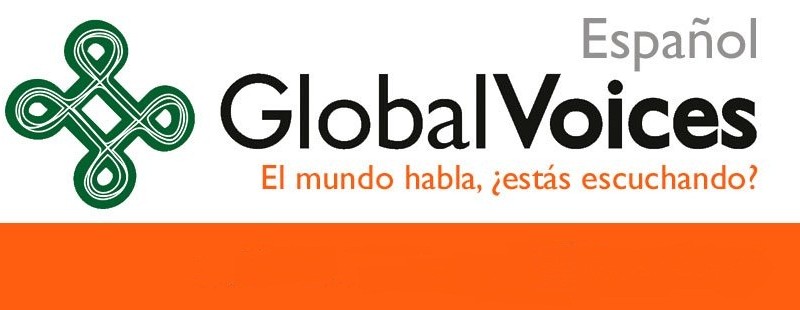
This October the 26th marked the 10th anniversary of the publication of the very first post on Global Voices. Although this date does not coincide with the precise day of launching of GV, it is one of the most important hallmarks to commemorate within our community.
Back then, Global Voices in Spanish was inexistent even as a project, as it is often said in reference to children when talking about the days they were not born yet; but now, ten years later, we exist and want to join to the celebration. We basically translate, but also write and reflect upon this site, with which we contribute and which we feel part of, even when we have ceased to contribute for some time now.
As part of this celebration, that is also a commemoration, we decided to translate the first posts that were published on Global Voices, the first 10 that is. Almost an archeological task you may say, but important we think, not only as a historical record, but also as an act of love. And going back to the metaphor of children, every child feels curiosity about how his parents met, about what they did before he was born.
Here are the first 10 posts of Global Voices, now also available in spanish:
27-Oct-2004 – Acerca de Global Voices Online: Sábado 11 de diciembre de 2004
– Programa de trabajo para el taller del 11 de diciembre de 2004
06-Nov-2004 – Amenazas de muerte contra Hoder
16-Nov-2004 – Agregador de Global Voices
– Plan de reunión actualizado
– Global Voices y Del.icio.us
18-Nov-2014 – Operación “Viral Freedom”
04-Dic-2014 – Reflexiones de Jim Moore
07-Dic-2014 – Cámara de resonancia, sensorio, reflexión y acción
08-Dic-2014 – Rashmi Sinha: algunos pensamientos y presentación
The list of posts goes on, of course, new authors appear (some are now old acquaintances, others unknown for most community members), the range of subjects expands, also the first posts reporting about local blogospheres, and in the end, Global Voices becomes Global Voices. That is why these 10 original posts are in some way special, they are the seed, the germinal element. One can almost feel the first heartbeats of Global Voices during the preparations for the first seminal meeting, among meditations about the future and probably the significant role of blogs and bloggers.
Cecilia Cárdenas, who translated these posts to Spanish, took some time to write about her impressions on the posts read during the translation process and she comments:
The subjects on discussion within our community are quite similar with past ones, for example, how we convey the message of voices from different cultures in order to make them understood by the audience without betraying their origin, particularly when it deals with issues that are “culture dependent,” how we conciliate our mission with survival within an internet that has been invaded by mass media, the defense of freedom of speech in all its forms, which will be the future of the media and which is our role in current media ecosystem.
Unfortunately, some of the challenges also persist, in 2004 we reported the death threats received by the iranian blogger Hossein Derakshan, who currently is in prison, and now we almost on a daily basis cover news about bloggers and authors being persecuted by their governments that considered them threats for the nation stability, like Zone9 or Alex Sodiquov, among others.
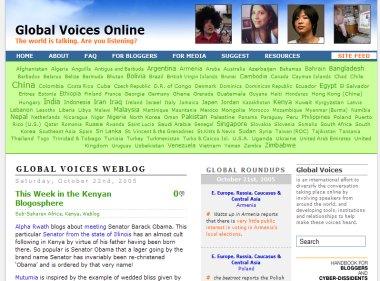
Global Voices website as in 2005. Image from Rebecca MacKinnon's blog: RConversation.
Personally, reading these old posts made me reflect on Global Voices back then and now. Thinking the same could happen to the other members of our community, I asked some contributors of GV in Spanish to share their views about certain posts from the 10 that have been translated. What could inspire them posts written 10 years ago about an environment so changing like internet? Did these posts get too old? What follows is a compendium of the result of such call.
Juliana Rincón, one of our “multinational” contributors, read the first two posts of Global Voices, related to the organization of the first meeting that joined who would become the first members of the community and she said:
One might say that the conversations that took place 10 years ago when GV was being born are the same we are still having… and this is very good. The questions that the initial group asked themselves are still valid and increasingly relevant: those that deal with how to be more inclusive, how to spread our work, and make the web a place where minorities can be more and better represented. While the tools evolve, the same happens with the answers to those questions and we can see what worked in the past and learn from our experience.
These conversations have been fruitful. After several years of discussing about how to develop strategies to spread the use of tools that enable citizens, activists and journalists to participate online, a branch of GV, Rising Voices, emerged devoted to bring more voices to the conversation. The talks about systems of protection and mechanisms to elude censorship and state blockeades resulted in the creation of another branch: Global Voices Advocacy. So I can not wait to see which will be the new project born from the conversations that will take place during the celebration of the 10th anniversary of Global Voices.
Juan Tadeo, a Mexican contributor, comments about the article Death threats against Hoder. From his post I took these paragraphs:
Ten years later from the post by Rebecca MacKinnon, What can we say now about Hoder? Luckily he is alive, though in prison in Teheran and subject to a judicial process that has received much criticism for having plenty examples of procedural violations since the beginning. Prior to been arrested Hoder wrote on The Guardian about censorship and leakage of contents on internet by the goverment of his country, inciting people to pressure the government to “force them to become accountable for and give transparency to proceedings that develop behind the scenes”.
Besides, he makes a call on the West “to help young lawyers from Iran, Pakistan, China and United Arab Emirates in order to use available legal resources to protect freedom of speech online”. In absence of characters like Hoder blogging the expression of ideas as we currently know it would be inconceivable and though the road to go is long and sinuous his example give us energy and motivation to devote more efforts to empower citizens and consolidate the right to information in all its forms.

Global Voices website as it was back in 2007.
Indira Cornelio, another Mexican contributor wrote also a post on her blog about the article she was asked to read: Global Voices Aggregator
Enabling a global conversation, generating a virtual space where the least heard voices and the stories neglected by mass media can be told, demand grabbing the technological tools that enable the flow of work “behind the scenes.” This is something that Global Voices requires and has learned to do: try out and support in the new technological tools. In the past it was De.licio.us, now the mailing lists enable the members of our big community to interact with each other from the various places in the world they live in.
Global Voices is always looking for being present on media where conversations are taking place, to bring the stories that are needed, the search of new tools is not only a task generated for internal work, but also a way to find new means to spread better generated contents. And thus it will go on trying new tools, moving forward to make all the voices heard.
Leila Nachawati, contributor from Spain and Syria, read Operation “Viral Freedom”, that deals with the development of a blogging tool in arabic and she could not help relating it with blogging during the events that became known as Arab Spring. In fact she wrote a post with her thoughts, from which I selected the following:
Back then, no one could predict what 2011 had in store for all of us; the explosion of hope, citizenship and self-expression that were ahead, and the brutal repression that regimes would unfold against their populations. However, reading many of the contributions prior to 2011 from a distance makes it clear that something was on the making, that the region was boiling, and that divide between citizens’ desire for change and their rulers was increasingly insurmountable.
Blog posts like “Viral Operation Freedom”, from 2004, highlight the increasing relevance of the interactions between citizens in the Middle East and North Africa, which turned out to be key in the organization and communication of the 2011 uprisings, and in pushing for civil-society building. […] Time and experience have made it clear that the attempts to control citizens increasingly involve controlling their digital communications. It has also proven the importance of developing and using free, independent and autonomous online tools and spaces.
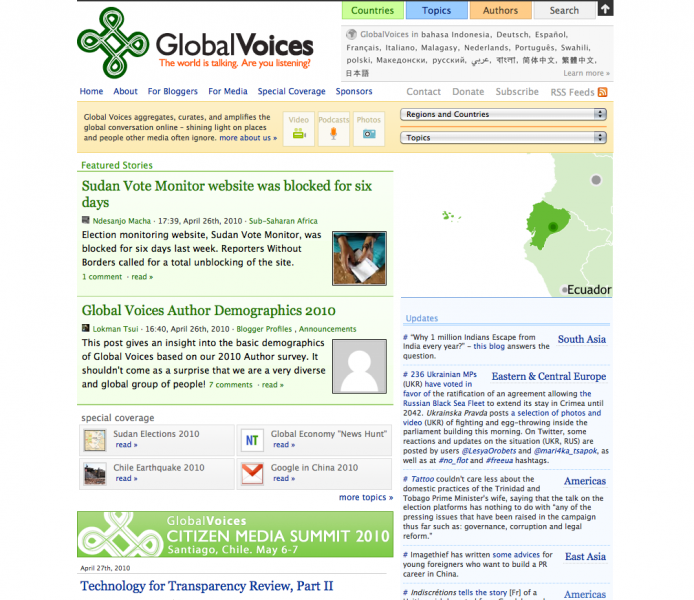
Global Voices website as in 2010.
Cati Restrepo, our Colombian contributor, worked on the post Thoughts from Jim Moore, that are basically ideas for “the widest possible agenda for global citizen dialogue.” She says:
Jim Moore's thoughts discuss intercultural dialogue or a debate on how we see each other, and how countries see each other; it deals with the concept of citizenship. The “citizen self” has been given many definitions, approaches, and developments that currently I would dare to name co-responsibility. In other words, “being citizen” is having on mind that building a society does not rely on the existence of a governmental structure; what seems to be the premise of the global demonstrations calling for better governments or new ones (Arab Spring) or demanding better education (Colombia, Chile).
Now, if we think about how the above mentioned is related to the enforcement of human rights, we reach the same point of co-responsibility, of how the legal and legislative systems must interact with citizens and viceversa to secure scenarios in which contexts are built based on the real recognition of the economic, social and cultural needs. In a globalized world in which the secret code to be accepted is “the economic category you belong to”, citizen moves seem to be demanding loudly the reinvindication of those other aspects of the context Jim Moore addresses in his post.
Osiris Jasso, another contributor from Mexico, comments on Echo chamber, sensorium, reflection, and action, that focus on Joi's question if blogs would contribute in the future to attract public attention to relevant issues.
In response to Ito's question, Moore uses the term “noosphere”, coined by french philosopher Teilhard de Chardin, in reference to a “sensorium”, that leads to reflection and action. This role is currently embodied by television and mass media, though they could even acquire a more relevant role in the future. He concludes highlighting that the blogosphere (from 2004) is not yet the noosphere Chardin refered to, but that from the group of bloggers could emerge the next generation of leaders:
In this respect I made the following considerations: 1) Tough the blogosphere of 2004 is not the current one, there are more posibbilities to access to platforms 2) we are still not the blogosphere Chardin dreamed of. This is true to the extent that the emergence of bigger blogging strategies appear to be proportional to the increase of factors that prevent bloggers from being really heard. It is necessary to remember that dialogues emerge from listening and that dialogues determine leadership. Activism occurs when there are leaders, true interlocution, so talking about blogs as equal to action is a path that is yet to be seen.
Finally, and to conclude, I asked another Global Voices fellow and also a close friend, Luis Carlos, to “think” about Global Voices. This is what he wrote:
I come from a country of symphonic orchestras, where you learn quickly that you need the diversity of instruments but you also need harmony, and just like that are the conversations in Global Voices. In 10 years of constant reading and knitted nets, I had the chance to hear other people, get to know countries from the voices of their people, and made their causes mine, because they are similar to my own, and above all, get to understand that good people need spaces to meet and reach mutual understanding.
We have been living in conflict for years. The interpretations about what is going on are increasingly complex. The world has changed a lot, or maybe we are living with more intensity, more quickly, the difference is that now countries have names of individuals, of friends, of accomplices, of people with a face.
These years I have been using the word “infociudadanía”, the power of citizen information, because I think that it captures this new human dimension that connects more with the power we have developed: public opinion and mobilizations. And we have indeed seen public mobilizations advocating for various causes. We have discovered the power of hyperconnected crowds and their skills. We feel we are part of a collective history that leaves a good record of both simultaneous and uneven construction of our dignity.
I come from a country divided and polarized. A country with two opposing melodies that makes it more difficult to tell what is going on in a collective manner. Nevertheless, Global Voices has encouraged us to understand that we are not alone and that there are causes that demand the participation of all of us, where solidarity is crucial though the day is not enough for so many worries.
I am grateful for the opportunity of reading them and to be read. I appreciate that you go on knitting the net.
¡Felices 10 años Global Voices!

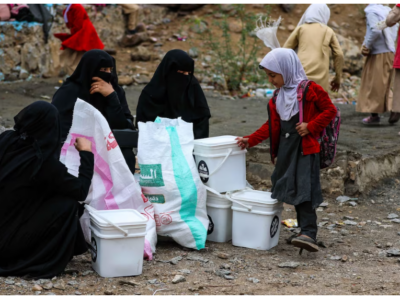
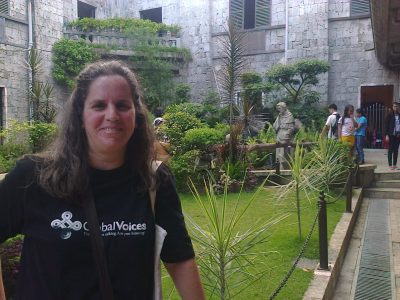

5 comments
Juan, what a beautiful birthday gift you and your team have prepared for Global Voices – it is wonderful to have the translations and fascinating to hear your reflections – a big ¡gracias! to you all!
Thank you Juan and Global Voices in Spanish for your creativity in translating history with contemporary commentary and creating this precious, unique treasure for us. Such an enthralling read!
A truly amazing gift, this. Thank you Juan and the Spanish team for coming up with this. It truly embodies the spirit of Global Voices. Thank you for sharing.
An absolutely brilliant idea for a post, Juan, and beautifully executed. A big thank you for doing this!
I can’t imagine a better gift for the anniversary :) Thank you Juan and thanks to the Spanish community!